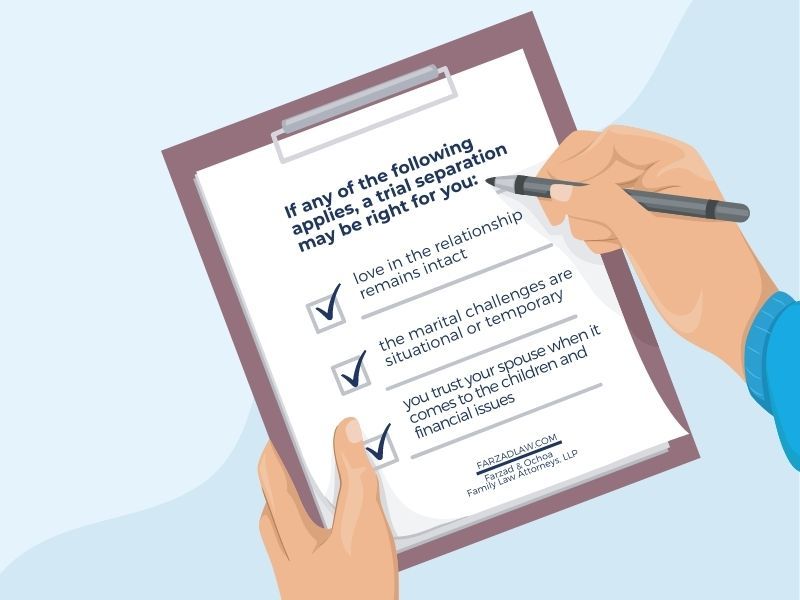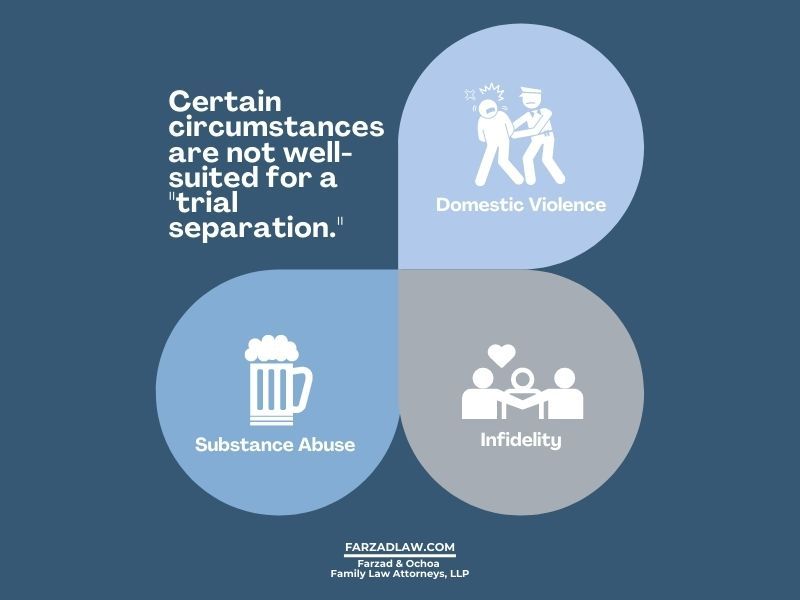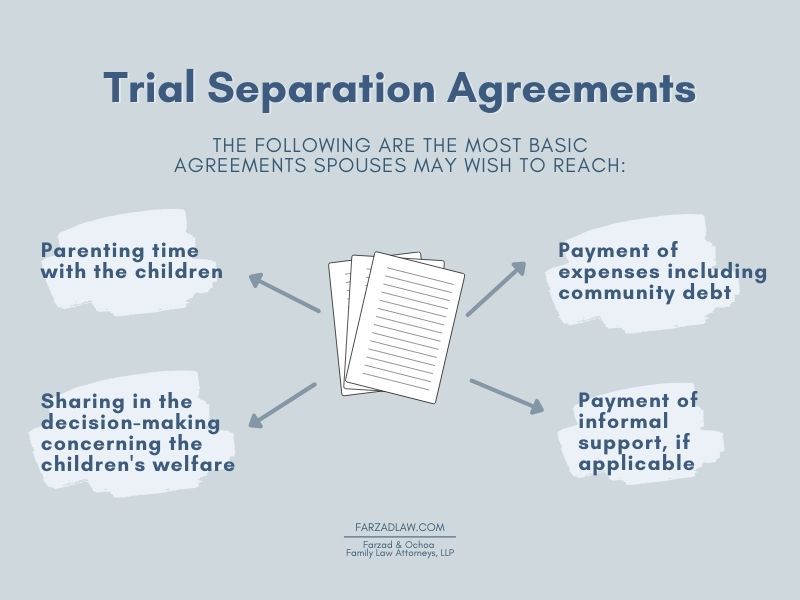What is a Trial Separation in California?
Learn what a trial separation is, a good checklist regarding it and how to do it right
A trial separation is a physical separation between spouses but without the intention to file for divorce immediately.
Most spouses who agree to a trial separation intend to give each other a break from the issues that placed significant stress on their marriage.
But is trial separation a good idea? And when is the best time for trial separation? Is there a checklist for trial separation? How do you do it right?
We will answer these questions and more in this family law guide.
Trial Separation Intends to Accomplish 4 Goals
Use these goals as a trial separation checklist to ensure you are doing it for the right reasons.
- Create much-needed space between spouses so they do not continue to aggravate each other on a day-to-day basis.
- Allow a reasonable passage of time so the spouses can heal from emotional wounds caused by the significant stress on their marriage.
- Provide a preview of how children will handle a separation in the event the spouses undergo a divorce.
- Provide a preview for the spouses to determine if they are happier separated from each other.
It is not a reach to state a trial separation is the other side of the same coin to residing together before marriage. Each is a preview of what may occur.
If you use the above as a checklist for your trial separation and build the plan around it, you may discover whether you are doing it for the right reasons.
Is trial separation between spouses a smart choice?
There is no right answer for every spouse. Just as spouses are unique individuals, the path spouses may take when there is significant stress on the marriage depends in large part on:
- Each spouse's tolerance to that stress,
- Each spouse's ability to cope, and
- The prospect of distress being a short-term or long-term issue.
As experienced divorce attorneys, we handle cases where spouses come to us after a trial separation just as we do so when spouses (or one of them) was completely disinterested in the trial separation. We are not therapists and therefore can only give the perspective of the divorce lawyer. Here is what we found.
Good reasons for trial separation

The following are what we believe to be good reasons for a trial separation.
1. Marital challenges that are situational or do not necessarily mean the marriage should end
While these can vary significantly between spouses, the most successful trial separations that help restore the marriage are those that did not involve significant marital problems that spanned many years. Instead, the marital problems were recent and isolated from the rest of the relationship.
2. The love in the relationship remains intact
This should be common sense but some spouses forget the whole reason they married is they wanted to spend the rest of their life with each other.
While easy to forget in the day-to-day life, if spouses still very much love each other but are overwhelmed by marital problems, a trial separation may make sense to remind them why they got married in the first place.
3. The spouses trust each other when it comes to the children and financial issues
Trial separation is serious. Spouses should not take a physical separation from each other lightly. It is an opportunity, if exploited, to negatively influence and affect the children and engage in misconduct related to finances.
A trial separation therefore requires spouses to trust each other as it relates to children so that each spouse will have frequent and regular time with the children.
Trial separation also requires spouses to be clear on financial issues including payment of expenses, maintaining the status quo on issues such as informal financial support for the lower earning spouse, all of which varies significantly depending on the situation.
Situations not well suited for a trial separation

Do not confuse what we write below with the premise that spouses should continue to live with each other if any of the following exist.
Our experience is the following situations cause such a breakdown in the marital relationship that trial separation usually does not work.
These are of course extreme situations. What spouses may consider "extreme" varies from one couple to another.
1. A history of pervasive, domestic violence
While spouses who are victims of ongoing domestic violence during the marriage often stick in those relationships and continue to experience physical abuse, they often do so because they believe themselves without any reasonable option.
Most domestic violence victims are under the physical, financial and/or emotional control of the abusive spouse.
There are exceptions and we have seen horrible violence at the hands of a homemaker against the breadwinner in the family.
We believe pervasive domestic violence has no place in a marriage and we rarely, if ever, see domestic violence perpetrators change their ways.
That is also why divorcing an abusive spouse comes with significant challenges. For those reasons, our experience is trial separation usually does not change the abuser's behavior.
2. Significant emotional abuse by one spouse against the other
While emotional abuse is a form of domestic violence, we did not put it under the domestic violence category so we can bring a greater attention to it.
Significant, ongoing emotional abuse is similar to domestic violence in that the perpetrator rarely changes his or her behavior just because there is a trial separation.
Similar to domestic violence, there are of course exceptions and we speak of only our experience in such situations. For these reasons, trial separation usually does not work well when one spouse is highly, emotionally abusive to the other on a frequent and continuing basis.
3. Serial infidelity
I have known husbands and wives who have engaged in infidelity but who were otherwise good people who love their spouse and their children and took great care of them.
There are many reasons for infidelity between spouses. Whatever the reason, the type we see rarely, if ever, change by a trial separation is the ongoing infidelity case.
While infidelity is common, pervasive infidelity throughout a marriage is not. Unless the spouses have an "open" marriage, it is also inexcusable as it shows a deep lack of respect for the other spouse and the marital bond.
Situations that involve pervasive and ongoing infidelity are also often those situations that involve ongoing emotional abuse. That is because pervasive infidelity is a form of emotional abuse in addition to an expression of complete disrespect for the other spouse and the family unit.
Learn more about how adultery affects divorce. Infidelity can even trigger breach of fiduciary duty claims during a divorce.
4. Pervasive and ongoing substance abuse
Similar to infidelity, substance abuse may be situational and limited in severity and duration. It is sometimes unfair to cast judgment on someone who develops an addiction to alcohol and drugs especially when there is no long-term history.
The legal profession unfortunately has many examples of those who are good lawyers and good people but who escape the stress of day-to-day practice and life with a bottle, a pill or worse.
Those situations where the substance abuse existed for many years and has deteriorated the foundation of the marital relationship usually does not lead to good results after a trial separation.
While there are exceptions and there are long-term addicts who seek and successfully achieve sobriety, the damage they cause to their spouse and children during the process can sometimes be too much to overcome.
That is not to say a spouse should give up on the marriage simply because there is substance abuse issue. The facts of each situation control the proper response.
Learn more about divorcing an alcoholic and divorcing an addict.
Your Strategy Session
About your strategy session
Southern California Offices
Locations
Our Services and Fees
Frequently asked questions
Strategy sessions are designed for those who are serious about their family law case, want to make informed and intelligent choices, and seek result-focused representation.
Trial separation agreements
Should the spouses come to agreement on trial separation terms?

Yes, it is wise for spouses to communicate about terms and come to agreement on the trial separation.
If spouses are dealing with a mid-sized to large financial estate or otherwise have complex issues, an attorney's advice is wise.
While it does not necessarily have to lead to something as formal as a postnuptial agreement, there is no way to know that until spouses meet with the experienced divorce attorney and discuss their specific situation.
Good communication is the key to surviving the trial separation.
Written agreements before trial separation
For those that do not want a formal written agreement, here are several issues the spouses should at least discuss and attempt to reach a consensus. Again, you can use this as a checklist and starting point for your trial separation.
- Parenting time with the children.
- Sharing in the decision-making as it relates to the children's health, education, safety and general welfare.
- Payment of expenses including community debt (family residence, vehicles, etc.) and other debts.
- Payment of informal support, if applicable. This includes those situations where one spouse earns more than the other spouse and is the breadwinner of the family. It is rare a lower earning spouse can afford to provide a reasonable standard living for herself or himself without financial help from the higher earning spouse.
Other topics to cover before trial separation
We consider the above to be the most basic agreements spouses may wish to reach. Most agreements will cover more topics than just the above and they should because every situation is unique to its own facts. Just a few examples of other topics include:
- marital counseling and therapy,
- the length of the trial separation,
- division of bank accounts during the trial separation,
- specific steps in cases that involve substance abuse or other issues that have permeated the marital relationship, etc. These steps may include outpatient or inpatient rehabilitation, as an example.
Trial separation in the same house?
I realize it sounds counterintuitive. How can spouses have a trial "separation" if they live in the same house?
From our experience, this is not a true trial separation. While it is possible for spouses to live separate lives while still living under the same roof (essentially act like detached roommates), that is likely impractical if:
- They have minor children, or
- One of them is financially dependent on the other one.
The more the spouses are tied to each other through kids and finances, the harder it will be to have a trial separation that meets its goals if they continue to live together.
Trial separation boundaries
Boundaries are important. Boundaries go beyond issues like parenting and finances. Trial separation boundaries focus on giving the other spouse the "space" he or she needs. That space, as we explained earlier, is to lower each spouse's stress, anxiety and potential fear and determine if the marriage can be saved.
A good trial separation checklist for boundaries
Here is a starting point for the boundary checklist.
- Extent of communication the spouses will have during trial separation. This is the "how often we will talk" portion of the separation.
- The ways the spouses will communicate during trial separation. For example, will they communicate by phone? Text? Zoom? A combination?
- A list of forbidden topics - For example, if certain topics are "triggers" for arguments, spouses may agree those topics are off the discussion list during trial separation.
- A sensitive topic is whether the spouses will date other people. This is dependent on the nature and extent of the trial separation. Just bringing up this topic may cause anger and a host of other emotions. So whether it is a boundary topic depends entirely on what the spouses want out of the trial separation and whether they are on the same page.
There are more boundary issues but the above is a good start.
Additional tips for a trial separation with kids
Kids enrich our lives. However, they also complicate it. A trial separation with kids will make the trial separation harder - count on it. That makes preparation more important.
We previously wrote about the importance of having a parenting plan in place.
Here are additional considerations and tips when there is a trial separation with kids.
- Decide whether you want a specific parenting plan with start and end times and exchange locations or one that is flexible. This depends on each parent's work schedule, other commitments and the children's ages. Parents sometimes start with specific guidelines and, if they see it is working great, build flexibility into it, as needed. The important thing is being realistic from the start. Avoid heroic measures that are completely inconsistent with the status quo and are therefore setting up the parents and the kids for failure.
- Agree on daily or near daily communication with the children. If both parents are good parents, there is no reason a trial separation has to exclude a parent and the children from each other on a day to day basis. Children and parents can speak by telephone or electronically through applications like FaceTime, Zoom, and more. This will at least allow regular contact even if there is a parenting schedule where the children are not in the presence of each parent daily.
- Assuming the parents can avoid conflict around the children, it may be a good idea to plan specific events with the parents and the children together. This may not be practical for some trial separations but for those that are, it sustains a normalcy for the children, especially if they are younger and having difficulty coping with the parents being apart.
- Get a therapist's help for how ongoing communication with the children should proceed. Kids are smarter than parents think. They see more, learn more and often have unanswered questions. If the parents jointly or even separately see qualified and experienced therapists, they can get tips and tools on how to effectively communicate with the children about the trial separation.
Trial separation is not a one-size-fits-all solution. Whether it is right for you depends on the level of trust and respect you and your spouse have for each other, despite challenges you each face in the marriage.
- B. Robert Farzad
Is trial separation right for you?
The answer to this question requires a collaboration between you and your spouse, potentially an experienced divorce attorney and a therapist.
Please do not take a cookie-cutter approach to whether trial separation is right for you. Just as a man and woman should take marriage seriously, they should also take any separation from each other seriously. It is more than just a question of time and space away from each other.
Through honest collaboration and diligence, you and your spouse can decide if trial separation is right for you.
How about additional great guides on questions you may have? Here are three more for those who crave knowledge.


